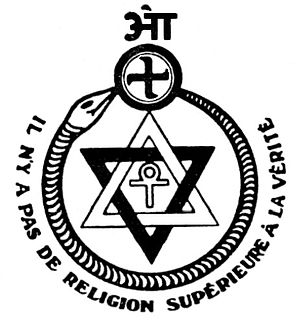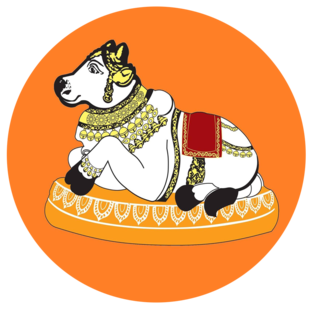
Nirvāṇa is commonly associated with Jainism and Buddhism, and represents its ultimate state of soteriological release, the liberation from repeated rebirth in saṃsāra.

The soul, in many religious, philosophical, and mythological traditions, is the incorporeal essence of a living being. Soul or psyche are the mental abilities of a living being: reason, character, feeling, consciousness, memory, perception, thinking, etc. Depending on the philosophical system, a soul can either be mortal or immortal. In Judeo-Christianity, only human beings have immortal souls. For example, the Catholic theologian Thomas Aquinas attributed "soul" (anima) to all organisms but argued that only human souls are immortal.

In Buddhism, the term anattā (Pali) or anātman (Sanskrit) refers to the doctrine of "non-self", that there is no unchanging, permanent self, soul or essence in living beings. It is one of the seven beneficial perceptions in Buddhism, and along with dukkha (suffering) and anicca (impermanence), it is one of three Right Understandings about the three marks of existence.

Indian philosophy refers to ancient philosophical traditions of the Indian subcontinent. The principal schools are classified as either orthodox or heterodox – āstika or nāstika – depending on one of three alternate criteria: whether it believes the Vedas as a valid source of knowledge; whether the school believes in the premises of Brahman and Atman; and whether the school believes in afterlife and Devas.

In Hinduism and Jainism, a jiva is a living being, or any entity imbued with a life force.
Paramatman or Paramātmā is the Absolute Atman, or supreme Self, in various philosophies such as the Vedanta and Yoga schools in Hindu theology, as well as other Indian religions like Sikhism. The Paramatman is the "Primordial Self" or the "Self Beyond" who is spiritually practically identical with the Absolute, identical with the Brahman. Selflessness is the attribute of Paramatman, where all personality/individuality vanishes.

The Septenary in Helena Blavatsky's teachings refers to the seven principles of man. In The Key to Theosophy she presents a synthesis of Eastern and Western ideas, according to which human nature consists of seven principles. These are:

The Aitareya Upanishad is a Mukhya Upanishad, associated with the Rigveda. It comprises the fourth, fifth and sixth chapters of the second book of Aitareya Aranyaka, which is one of the four layers of Rig vedic text.

The tattvas in Indian philosophy are elements or principles of reality. Tattvas are the basic concepts to understand the nature of absolute, the souls and the universe in Samkhya and Shaivite philosophies. Samkhya philosophy lists 25 tattvas while later Shaivite philosophies extend the number to 36.

Brahman connotes the highest Universal Principle, the Ultimate Reality in the universe. In major schools of Hindu philosophy, it is the material, efficient, formal and final cause of all that exists. It is the pervasive, genderless, infinite, eternal truth and bliss which does not change, yet is the cause of all changes. Brahman as a metaphysical concept is the single binding unity behind diversity in all that exists in the universe.
Self-realization is an expression used in Western psychology, philosophy, and spirituality; and in Indian religions. In the Western understanding it is the "fulfillment by oneself of the possibilities of one's character or personality." In the Indian understanding, self-realization is liberating knowledge of the true Self, either as the permanent undying Atman, or as the absence (sunyata) of such a permanent Self.
Anātman in Sanskrit means that "which is different from atman" or "non-self". In Hinduism, the former definition is found in some texts, while in Buddhism, anātman or anattā means non-self.
According to Sarira Traya, the Doctrine of the Three bodies in Hinduism, the human being is composed of three sariras or "bodies" emanating from Brahman by avidya, "ignorance" or "nescience". They are often equated with the five koshas (sheaths), which cover the atman. The Three Bodies Doctrine is an essential doctrine in Indian philosophy and religion, especially Yoga, Advaita Vedanta and Tantra.
Jivatva means – the state of life or the state of the individual soul. Jivatva is the state of life of the Jiva, the living entity, which is a particular manifestation of Atman, the embodied being limited to psycho-physical states, and the source of avidya that suffers (repeated) transmigration as result of its actions. Until ignorance ceases the Jiva remains caught in experience of the results of actions bringing merit and demerit, and in the state of individuality (jivatva), and so long as the connection with the intellect as conditioning adjunct lasts, so long the individuality and transmigration of soul lasts.

The Kaivalya Upanishad is an ancient Sanskrit text and one of the minor Upanishads of Hinduism. It is classified as a Shaiva Upanishad, and survives into the modern times in two versions, one attached to the Krishna Yajurveda and other attached to the Atharvaveda. It is, as an Upanishad, a part of the corpus of Vedanta literature collection that present the philosophical concepts of Hinduism.

Ātma-bodha is a short Sanskrit text attributed to Adi Shankara of Advaita Vedanta school of Hindu philosophy. The text in sixty-eight verses describes the path to Self-knowledge or the awareness of Atman.

The Subala Upanishad, also called Subalopanishad (सुबालोपनिषत्), is a Upanishad written in Sanskrit. It is attached to the Shukla Yajurveda, and classified as one of the Samanya Upanishads of Hinduism.











